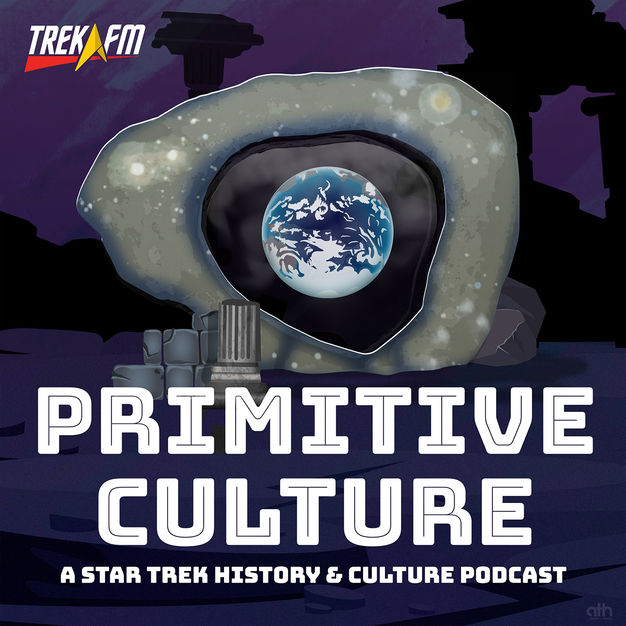
Primitive Culture: A Star Trek History and Culture Podcast
Primitive Culture is a Trek.fm podcast dedicated to a deep examination of the connections between Star Trek and our own history and culture. In each episode, Duncan Barrett, Clara Cook, and Tony Black take you on a fascinating exploration of how our world inspires the franchise we love—and how that franchise inspires us.
- 59 minutes 30 seconds126: Progressive Nostalgia?
Music in Star Trek
From Alexander Courage’s “bright galactic beguine” in The Original Series to Jeff Russo’s churning, Game of Thrones-style theme for Discovery, the music of Star Trek has always embodied the spirit of its time, as much as it looks to the future. Rick Berman famously sacked composer Ron Jones from The Next Generation because he felt his scores drew too much attention to themselves. In his mind, the underscore should be a kind of wallpaper, as unobtrusive as the soft pastel carpet stuck to the walls of the Enterprise-D. And yet the music of Star Trek—in particular the film scores by Jerry Goldsmith, James Horner, and others—has become an iconic part of the franchise’s cultural legacy, and of popular culture more broadly.
In this episode of Primitive Culture, host Duncan Barrett is joined by musicologists Jessica Getman and Evan Ware. Together with Brooke McCorkle Okazaki, they are the editors of the recently published Music in Star Trek: Sound, Utopia, and the Future. Here, they share some key observations from the 15 essays collected in their book, as well as consider the future of the Star Trek franchise—in music and beyond.
Chapters Intro (00:00:00) Blue Skies Thinking (00:09:15) Beware the Borg Fugue (00:17:00) Losing Faith … (00:24:45) Course Correction (00:37:20) Scoring the Sausage (00:49:50)
Host Duncan Barrett
Guests Jessica Getman and Evan Ware
Production Duncan Barrett (Editor and Producer) C Bryan Jones (Executive Producer) Matthew Rushing (Executive Producer)
9 March 2023, 12:40 am - 1 hour 30 minutes125: Five-Year Mission
Half a Decade of Primitive Culture
Star Trek’s original five-year mission was brought to a premature end in 1969. But over the ensuing half-century and more, the franchise has continued boldly going to new frontiers. By the 1980s, when a second generation of fans came to seek out fresh adventures, the voyage had become a continuing mission … with no end in sight.
In this episode of Primitive Culture, recorded earlier this year on our own five-year anniversary, host Duncan Barrett is joined by show co-founder Tony Black to look back on a half-decade of podcasting, and to consider how Star Trek has changed since the good ship Primitive Culture left spacedock in 2017. We also share some news about the future of the podcast. Because, as we know, all good things …
Host Duncan Barrett
Guest Tony Black
Production Tony Black (Editor) Duncan Barrett (Producer) C Bryan Jones (Executive Producer) Matthew Rushing (Executive Producer)
3 October 2022, 11:44 am - 1 hour 55 minutes124: Just Following Orders?
Cardassian war crimes and The Man in the Glass Booth
For many fans of Deep Space Nine, the penultimate installment of Season 1, “Duet,” is also the show’s first classic episode. A bleak exploration of guilt, responsibility, and forgiveness in the aftermath of war, it’s a story that could scarcely have been told on any other Star Trek series. One of Trek’s most popular bottle episodes, “Duet” is built on intense two-hander scenes between Nana Visitor and guest star Harris Yuelin, giving it the air of an intimate theater production. It’s perhaps no surprise, then, that the episode’s central conceit—a case of mistaken identity at the center of a potential war crimes trial—is lifted from a stage play, Robert Shaw’s The Man in the Glass Booth, which was later adapted into an Oscar-winning movie.
In this episode of Primitive Culture, host Duncan Barrett is joined by Clara Cook to discuss the parallels between “Duet” and this enigmatic source material, which in turn borrows from the real-life trial of Adolf Eichmann, the original man in a (bullet-proof) glass booth. Broadening the conversation to include Star Trek’s approach to war crimes more generally, we consider whether the Eichmann trial—as well as the Nuremberg trials immediately after the war—offer a valid precedent for Federation and Bajoran justice.
Host Duncan Barrett
Guest Clara Cook
Production Duncan Barrett (Editor and Producer) C Bryan Jones (Executive Producer) Matthew Rushing (Executive Producer)
6 September 2022, 1:12 pm - 1 hour 1 minute123: Neurodiversity in Infinite Combinations
Autistic representation in Star Trek
“Perhaps you’re just different,” Tam Elbrun tells Data in the Next Generation episode “Tin Man.” “Not a sin, you know, though you may have heard otherwise.” Both characters—the emotionally sensitive Betazoid and the supposedly emotionless android—have been seen by fans as allegories of a particular kind of difference, standing in for those on the broad spectrum of neurodiversity.
In this episode of Primitive Culture, host Duncan Barrett is joined by autistic Star Trek fan Thad Hait to discuss how Trek has encoded the experiences of neurodiverse people—often accidentally—over the course of its long history. Looking at characters such as Data, Seven of Nine, Reginald Barclay, and Sylvia Tilly, we consider how Starfleet’s approach to difference both mirrors and differs from our own, and ask whether the time is ripe for Trek’s first explicitly neurodiverse character.
Host Duncan Barrett
Guest Thad Hait
Production Duncan Barrett (Editor and Producer) C Bryan Jones (Executive Producer) Matthew Rushing (Executive Producer)
25 August 2022, 11:51 am - 1 hour 44 minutes122: Identical Strangers
Star Trek’s Double Troubles
Don’t they say you die if you meet yourself? Our intrepid Starfleet officers had better hope the answer is no, since encounters with doubles, doppelgängers, and duplicates appear to be just part of the job. From the two Kirks in “The Enemy Within” to Lower Decks’s twinned Boimlers, Star Trek has offered up a host of alt versions of our regular characters over the years.
In this episode of Primitive Culture, host Duncan Barrett is joined by Clara Cook for a look at Star Trek’s doubles, setting them in the context of their literary and cultural forebears, all the way back to Dostoevsky. We consider Sigmund Freud’s work on The Uncanny, Carl Jung’s idea of the shadow projection, and the sinister interplay between doubles and death. We also ponder why some characters seem to get on with their other selves just fine while the very notion that they aren’t entirely unique in the universe is enough to prompt an existential crisis for others.
Host Duncan Barrett
Guest Clara Cook
Production Duncan Barrett (Editor and Producer) C Bryan Jones (Executive Producer) Matthew Rushing (Executive Producer)
30 July 2022, 4:56 am - 1 hour 12 minutes121: When Is an Allegory Not an Allegory?
Trans representation in Star Trek.
In 2022, trans characters in Star Trek have become part of the fabric of humanity’s shared future in space. In addition to Adira and Gray Tal in Discovery, we’ve been treated to the villainess Captain Angel in Strange New Worlds and even an explicitly non-binary character, the Medusan Zero, in Prodigy. But a few decades ago, Star Trek’s most direct engagement with trans culture was the truly toe-curling Deep Space Nine episode “Profit and Lace.” That said, a number of stories from both The Next Generation and Deep Space Nine had touched on trans issues more obliquely—in many cases unintentionally.
In this episode of Primitive Culture, originally released as part of Tony Black’s podcast The Sanctuary, Tony is joined by Orion Armstrong for a look at the TNG episode “The Outcast,”which was intended by writer Jeri Taylor as an allegory about gay conversion therapy but is open to very different readings today as a trans story. They also discuss TNG’s “The Host,” DS9’s “Rejoined,” and more. And, in a new introduction, Duncan and Tony catch up with developments since the podcast was originally released.
Hosts Duncan Barrett and Tony Black
Guest Orion Armstrong
Production Duncan Barrett (Editor and Producer) C Bryan Jones (Executive Producer) Matthew Rushing (Executive Producer)
17 July 2022, 12:34 pm - 1 hour 9 minutes120: Resurrecting Nightmares
The Alien franchise and Star Trek: Strange New Worlds.
In space, no one can hear you scream. But for unlucky Starfleet landing parties, meeting a nightmarish alien menace can prove as traumatic as deadly. For La'an Noonien-Singh, who carries the burden of having survived captivity in a Gorn breeding colony during childhood, another encounter with the monstrous lizards proves both physically and mentally challenging. And to make sure the audience is equally freaked out by the terrifying encounter, Strange New Worlds leans heavily on the imagery of the Alien franchise—the epitome of sf horror.
In this episode of Primitive Culture, host Duncan Barrett is joined by Lee Hutchison to look at the latest episode of Star Trek: trange New Worlds, “All Those Who Wander,” alongside the films that inspired it, from the chest-burster scene in the original 1979 movie to Ripley’s final moments in Alien 3. We also take in reference points from the beloved movies we grew up with, including Predator, Jurassic Park, The Thing, and more. What new life forms are birthed when these iconic stories creep in through the Star Trek airlock? Grab a flamethrower and join us on the express elevator to hell as we attempt to find out.
Chapters Intro (00:00:00) Gorn Yesterday (00:09:50) Strange Newt Worlds (00:23:55) No Sex, Please, We’re Star Trek (00:31:15) That Which Survives (00:50:00) La'an Time No See? (01:04:00)
Host Duncan Barrett
Guest Lee Hutchison Production Duncan Barrett (Editor and Producer) C Bryan Jones (Executive Producer) Matthew Rushing (Executive Producer)
30 June 2022, 3:53 pm - 1 hour 26 minutes119: Cowboy Diplomats
How Star Trek’s leaders reflect our own.
Young, charismatic, and a bit of a ladies’ man, Captain James T. Kirk was cast in the mould of President John F. Kennedy, the beloved US leader who had been killed just three years before Star Trek debuted. But over the course of more than half a century, Star Trek’s captains have often echoed the great politicians of the day; and sometimes they may even have paved the way for political careers in the real world.
In this episode of Primitive Culture, originally released as an installment of The Sanctuary, Tony Black speaks to guest Mac Boyle about the parallels between Star Trek’s leaders and our own. Where do the likes of former UK Prime Minister Margaret Thatcher, former US President Donald Trump, and current US President Joe Biden find their counterparts in the Star Trek universe? And what kind of characters can we expect in the future to take their cues from Russian President Vladimir Putin and Ukrainian President Volodymyr Zelensky? With Star Trek: Discovery’s Federation President Laira Rillak taking an ongoing role, has Trek finally managed to marry the military ethos of Starfleet with the business of intergalactic politics?
Chapters Intro (00:00:00) Assignment: Earth (00:03:25) The Maquis (00:16:30) Strange New Worlds (00:48:30)
Hosts Duncan Barrett and Tony Black
Guest Mac Boyle
Production Tony Black (Editor) Duncan Barrett (Producer) C Bryan Jones (Executive Producer) Matthew Rushing (Executive Producer)
29 May 2022, 12:17 pm - 56 minutes 53 seconds118: Servants to Two Masters
Star Trek’s backdoor pilots.
The year is 1968. As Star Trek goes off the air for good, a new show—Assignment: Earth—debuts from some of the same creative team. For dedicated Trekkies, the premise is already familiar and the two leads, Gary Seven and Roberta Lincoln, have a head start garnering fans of their own. That, at least, is what might have been had Star Trek not been renewed for a third season. As things turned out, the episode featuring Seven and Lincoln was simply the finale of Star Trek’s second-season, not the series, and “Assignment: Earth” was never picked up as a show in its own right.
In this episode of Primitive Culture, host Duncan Barrett is joined by Tony Black for a look at Star Trek’s most famous backdoor pilot, an episode that lays out the premise for a potential future show, using the budget and production infrastructure of an existing one. “Assignment: Earth” might be Star Trek’s most blatant use of this sneaky approach, but more recent examples include “Point of Light,” “Terra Firma,” and “All Is Possible.” These three installments of Star Trek: Discovery seem to hint pretty strongly at shows that might be coming down the pipe. And then there’s Discovery’s entire second season, which set up not only Strange New Worlds—and introduced new actors in the roles of Captain Pike, Spock, and the original Number One—but the long-awaited Section 31 show as well. What are the benefits—and pitfalls—of taking the backdoor route to a new project? And do such stories inevitably struggle to function as episodes of two different shows simultaneously?
Host Duncan Barrett
Guest Tony Black
Production Tony Black (Editor) Duncan Barrett (Producer) C Bryan Jones (Executive Producer) Matthew Rushing (Executive Producer)
5 May 2022, 2:28 am - 1 hour 16 minutes117: What If ...
… it wasn’t the Vulcans who made first contact?
April 5, 2063. In Star Trek’s imagined history, it was on this date that humanity made first contact with an alien race. The event led to societal transformation on a global scale and ushered in a bright future. But what if it wasn’t the Vulcans who happened to be passing by that day? What if first contact had been made with the Klingons or Romulans instead?
In this episode of Primitive Culture, originally recorded for The Sanctuary, but never released, Tony Black is joined by Mike Slamer to imagine how things could have played out differently.
Hosts Duncan Barrett and Tony Black
Guest Mike Slamer
Production Tony Black (Editor) Duncan Barrett (Producer) C Bryan Jones (Executive Producer) Matthew Rushing (Executive Producer)
5 April 2022, 8:25 am - 1 hour 20 minutes116: Sex and Shooting
Captain Picard and Indiana Jones.
Wise, measured, and distinctly unromantic, Captain Jean-Luc Picard was conceived from the start as very different from his predecessor, James T. Kirk. But for Patrick Stewart, the lack of physical drama felt creatively unsatisfying. In October 1988, he wrote a letter to Gene Roddenberry outlining his desire for Picard to get some “action”—in more ways than one.
It would be over a year before Stewart’s request was granted, in the third-season episode “Captain’s Holiday.” As writer Ira Steven Behr recalled, the instructions he was given were, “Just get the Captain laid.” This he accomplished, somewhat incongruously, by marrying the normally cool captain with a contemporary action-adventure hero: Indiana Jones. The curious melding stuck, and in episodes such as “The Chase,” “Gambit,” and “QPid,” Picard’s passion for archaeology—along with his swashbuckling heroism—added an extra arrow to the good captain’s quiver.
In this episode of Primitive Culture, recorded last year when the fifth Indiana Jones movie was filming in Glasgow, host Duncan Barrett is joined by Indy super fan Carlos Miranda to compare and contrast these adventuring archaeologists, both returning for their latest escapades well into their golden years. Is the staid life of a university professor—or a Federation diplomat—really compatible with the thrills and spills of derring-do? And what might these two men’s fascination with the lives of their ancient forebears reveal about their relationships with the fathers who went before them?
Host Duncan Barrett
Guest Carlos Miranda
Production Duncan Barrett (Editor and Producer) C Bryan Jones (Executive Producer) Matthew Rushing (Executive Producer)
27 March 2022, 2:09 am - More Episodes? Get the App
Your feedback is valuable to us. Should you encounter any bugs, glitches, lack of functionality or other problems, please email us on [email protected] or join Moon.FM Telegram Group where you can talk directly to the dev team who are happy to answer any queries.
 Punch It: Writing in Star Trek
Punch It: Writing in Star Trek
 Ceti Alpha 3: A Star Trek Podcast
Ceti Alpha 3: A Star Trek Podcast
 TrekRanks - Member of The Tricorder Transmissions : a Star Trek Podcast Network
TrekRanks - Member of The Tricorder Transmissions : a Star Trek Podcast Network
 Strange New Worlds: A Science & Star Trek Podcast
Strange New Worlds: A Science & Star Trek Podcast
 Trek Profiles Podcast
Trek Profiles Podcast
 The Tricorder Transmissions : a Star Trek podcast
The Tricorder Transmissions : a Star Trek podcast